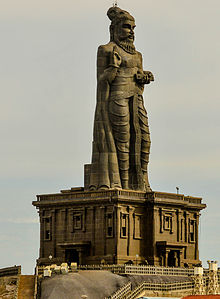Thirukkural

Statue of Thiruvalluvar at Kanyakumari
|
|
| Author | Thiruvalluvar |
|---|---|
| Original title | Muppaal |
| Working title | Thirukkural |
| Country | India |
| Language | Old Tamil |
| Series | Patiṉeṇkīḻkaṇakku |
| Subject | Secular ethics |
| Genre | Poetry |
| Published | Palm-leaf manuscript of the Tamil Sangam era (possibly between 4th and 1st centuries BCE) |
|
Publication date
|
1812 (first known printed edition) |
|
Published in English
|
1840 |
The Tirukkural or Thirukkural (Tamil Name: திருக்குறள்), or shortly the Kural, is a classic Tamil sangam literature consisting of 1330 couplets or kurals, dealing with the everyday virtues of an individual. Considered one of the greatest works ever written on ethics and morality, chiefly secular ethics, it is known for its universality and non-denominational nature. It was authored by Valluvar, also known as Thiruvalluvar.
Considered as chef d'oeuvre of both Indian and world literature, the Tirukkural is one of the most important works in the Tamil language. This is reflected in some of the other names by which the text is given by, such as Tamiḻ maṟai (Tamil veda), Poyyāmoḻi (words that never fail), and Deyva (Deiva) nūl (divine text). Translated into at least 82 languages (as of 2014), Tirukkural is one of the most widely translated non-religious works in the world. The work is dated to sometime between the third and first centuries BCE and is considered to precede Silappatikaram (1st century CE) and Manimekalai (between 1st and 5th centuries CE), since they both acknowledge the Kural text.
The Tirukkural is structured into 133 chapters, each containing 10 couplets (or kurals), for a total of 1330 couplets. The 133 chapters are grouped into three sections:.
Each kural or couplet contains exactly seven words, known as cirs, with four cirs on the first line and three on the second. A cir is a single or a combination of more than one Tamil word. For example, Thirukkural is a cir formed by combining the two words thiru and kuṛaḷ. The section Aram contains 380 verses, Porul has 700 and Inbam has 250.
The overall organisation of the Kural text is based on seven ideals prescribed for a commoner besides observations of love.
...
Wikipedia
